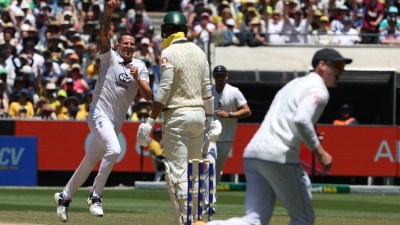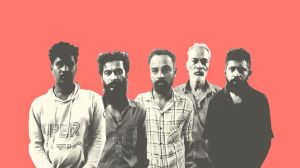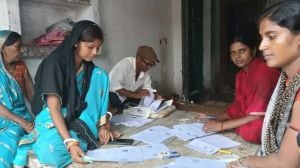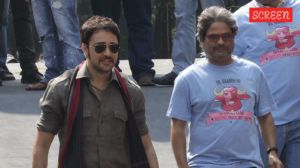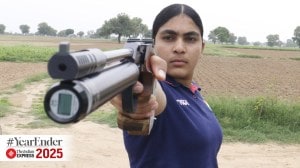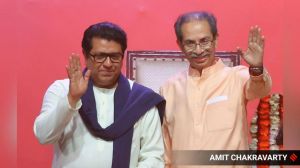LOST IN CUSTODY
Found roaming the streets, Lakshya was adopted by an industrialist family in Delhi four years ago, only to be returned to his biological parents...

Found roaming the streets, Lakshya was adopted by an industrialist family in Delhi four years ago, only to be returned to his biological parents after a long-drawn custody battle. The Sunday Express catches up with him as he tries to adapt to a new life, a place he barely remembers as home.
Six-year-old Lakshya Jindal loves ice-cold mango frooties. And if you ask him what his favourite snack is, he8217;ll scream, 8220;burgers8221;. Growing up in a sprawling mansion in West Punjabi Bagh, like any child from an affluent family in New Delhi, he was raised by parents with a readily disposable income to meet his every need and fancy.
Then one day, Lakshya8217;s mother, Vandana Jindal, and father, industrialist Anil Jindal, a cousin of MP Naveen Jindal, took him on a drive to the Uttam Nagar police station. Here, they introduced him to Babita and Dinesh Kumar Sharma. Quick as lightning, Lakshya was handed over to strangers he was told were his 8220;real8221; parents; biological would be too difficult to explain.
With this exchange on March 11, 2008, four long years of courtroom drama came to a close: the Sharmas were granted legal custody of their son, Lakshya8212;or Prateek as they named him at birth. And the Jindals, who had adopted Lakshya8212;lost in 2004 and deposited by police at the Bal Vihar Orphanage Centre in Palam8212;and raised him for four years, returned home without him.
Within minutes, Lakshya was transported back to lanes, long forgotten, where he once played; to his new home8212;a solitary room, which his parents rent for Rs 800 a month, in a crumbling, rudimentary brick house on a dusty track off Peepal Chowk in Mohan Gardens.
The contrast to Jindal House could not be starker.
middot;middot;middot;
SITTING in the corner of a dimly lit room, Lakshya is looking down, resolutely, at the floor. Almost two months after he was returned to his biological parents, he is struggling to adapt to a family and life he does not remember.
8220;As a baby, Lakshya would play peacefully for hours. But now he8217;s very naughty,8221; says Babita, 23, who flits between the names Prateek and Lakshya, admitting she quite likes the name the Jindals gave her son; Dinesh, however, will only use Prateek.
When first relocated, Lakshya8217;s erratic behaviour8212;throwing pots and pans, shouting, rude comments, fighting with cousins8212;was frequent, says Babita. 8220;He8217;s beginning to listen now that I scold and slap him ever so often,8221; she adds with a grin, 8220;he8217;s learning more manners here.8221;
Mood swings still offer Lakshya an outlet for the anger and confusion over his displacement.
Slowly, however, he is adapting. 8220;When he first got here, he was scared to use the toilet,8221; says Babita.
Provoked into self-defence, Lakshya breaks his silence, quick to interject: 8220;It8217;s dirty and it smells!8221; But faced with a traditional Indian toilet, he soon learned to squat; a change of water, leading to looser motions, meant he was forced to learn fast.
Accepting his new family is more difficult. Mummy and Papa, for Lakshya, are still Anil and Vandana Jindal.
Babita, meanwhile, is relegated to 8216;Rani mummy8217;, coined by her cousin to ease his transition home. 8220;It doesn8217;t bother me. I8217;m glad my son is loyal,8221; Babita says wistfully.
But, at the same time, she seems worried about Lakshya. 8220;He talks about the Jindals 24 hours a day. He can8217;t hear a word against them,8221; says Babita.
8220;Sometimes he cries. And once he told me, if we both go back, mummy will look after you too.8221;
Dinesh loves his son, 8220;or else he wouldn8217;t have spent so many years fighting for him,8221; says Babita. But his alcoholism and the occasional violence at home have not escaped Lakshya8217;s eyes. 8220;I8217;ll tell her about it,8221; he threatens his mother, alluding to what he8217;s seen but can8217;t understand, before Babita explains for him.
8220;Sometimes, in some ways, I think it8217;s better for him to live with the Jindals,8221; she muses. 8220;But my husband would never allow it. And he8217;s our only son. I8217;m so much happier now that we have him. If I had another son, perhaps, I could have given him up.8221;
Lakshya, however, is clear, when asked where he8217;d prefer to live. 8220;I want to live with the Jindals,8221; he says, mumbling something about 8220;Prateek bhaiya8221; one of the Jindals8217; two other sons. 8220;There I don8217;t wear ripped clothes,8221; he says pointing to the tears in his jeans. 8220;And I have more toys. A toy car,8221; he begins, before drifting, once again, into silence, desperately avoiding eye contact.
Knowing her son has spent four years in opulence can be tough, says Babita, but she8217;s been trying her best to meet his demands. Yesterday, they ate Chinese food, and today she8217;s just stocked up on Maggi noodles, another of Lakshya8217;s favourites.
But without a regular job, Dinesh, a driver, draws only about Rs 7,000 a month. 8220;If we can8217;t give Lakshya something he asks for, I feel bad,8221; says Babita.
The Sharmas have started looking at schools for Lakshya where he8217;ll be enrolled after the summer vacation.
It won8217;t be a premium private school like he attended in the past-Mother8217;s Pride or Anil Jindal8217;s own school, Jindal Public School8212;but Babita is adamant that neither will it be a government school.
Given his 8220;high-fly8221; schooling, she is surprised at Lakshya8217;s dependence on her. 8220;He can8217;t do anything8212;I wash him, change his clothes. For that he had servants. But he can8217;t even write his name! What has he learned during four years with these big people?8221; she asks.
To this, Lakshya responds: 8220;I8217;ve forgotten everything.8221;
middot;middot;middot;
SHOWING off his dance moves to the beats of the latest Bollywood tune, Lakshya seems to be settling, though with difficulty, into his new home. Visibly fond of his Rani mummy, he also enjoys spending time with his grandmother and two-year-old sister Kittu. Dinesh is working longer hours and drinking less. Both parents, says Babita, are recovering from ill health, the stress of fighting for their son.
The Jindals, meanwhile, have not contacted Lakshya since his return home.
8220;He8217;s found his real parents now,8221; said Anil. 8220;I have two other sons. We adopted Lakshya because he was very ill when I saw him at the orphanage.8221;
Visiting him is out of question, he says, asking, 8220;How will it be for his career? If he sees me it will be difficult for him.8221;
About life with Lakshya, the Jindals will not speak. 8220;I don8217;t want to renew the painful time,8221; he says.
But Sonia Sachdeva, a teacher at Mother8217;s Pride, shares her memories of Lakshya from West Punjabi Bagh.
8220;He was a charming and mischievous boy, very curious,8221; she says, recollecting Anil and Vandana Jindal too at school celebrations and parent-teacher meetings.
8220;The parents and the child seemed attached to each another. Lakshya was definitely being well looked after. An impressive boy,8221; she adds.
Walking away from the Sharma8217;s home, I hear the urgent shuffle of feet and cast back a glance. I stop and watch as Lakshya leaps across the open drain circling his house, skips past the neighbouring plot of land, strewn carelessly with litter, and runs towards me. 8220;Are you going to see the Jindals?8221; he asks, eagerly, hopefully.
4 Lakshya with his mother Babita
Photographs by Amit mehra; Imaging by raajan
THE CASE
It was on February 18, 2004 that two-year-old Prateek later named Lakshya went missing. His mother Babita, after an argument with her husband Dinesh, had gone to live with her mother, leaving Prateek behind. In an attempt to reconcile the married couple, Dinesh8217;s sister, Shashi Sharma, took Prateek to Babita. At the house, once Shashi spotted Prateek8217;s grandmother, she left him at the gate. The grandmother, thinking Prateek had left with the aunt, returned inside. Only 20 days later, when Dinesh and Babita reached a compromise and renewed communication, did they realise their son was not in the care of either parent.
Found roaming alone that same day on Shukra Bazar Road, Matiala, Prateek was picked up by a police officer and taken to Matiala Police Station. The whirlwind speed8212;42 minutes according to Dinesh8217;s advocate, D.D. Singhla8212;with which he was deposited at the Bal Vihar Orphanage Centre in Palam, without adequate checks about the child8217;s family, has come under attack from the court. The police8217;s treatment of Dinesh, when he repeatedly inquired about his son8217;s whereabouts, has also been criticised.
On a visit to the orphanage, Anil Jindal, who provided education, healthcare and one meal a day to its children, spotted Prateek. Within 11 days, Prateek, now called Lakshya, was adopted.
An inquiry into the conduct of the police, the orphanage and the Jindals in what the court views as a highly flawed adoption is underway, the report will be submitted by May 5. In July 2004, when Dinesh first discovered Prateek was in the care of the Jindals, his demands for his son were turned down; Anil Jindal said he could not be sure of Dinesh8217;s paternity. The Sharmas went to the courts in October 2005.
The Jindals later argued they could provide Lakshya with a better quality of life and opportunities than his biological parents, that he was already mentally and emotionally connected to the family.
But for Singhla, who successfully won custody rights for the Sharmas, this calls for a wider debate. 8220;Should poor and less fortunate families not have the right to retain their children? Is a child8217;s welfare directly connected to the wealth he grows up with? I also grew up wearing ripped clothes. I studied in a government school, and went to the Panjab University. I turned out okay.8221;
- 01
- 02
- 03
- 04
- 05


